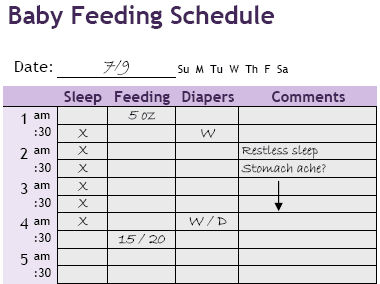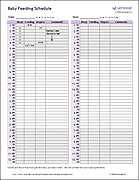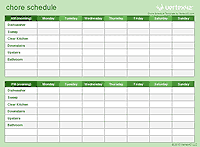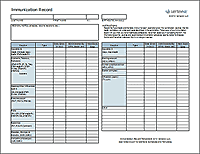Baby Feeding Schedule
After our newest arrival, the hospital gave us a basic baby feeding chart to take home. That of course sparked an interest in creating one ourselves. A simple baby schedule has also been a top request by family members recently. Whether you are a new or experienced parent, life with a newborn or infant in the home is crazy. There are so many details to keep track of, it is easy to forget when you last fed your baby or changed her diaper. Our Baby Schedule template is meant to relieve some stress in any parent's life by allowing the parent to clearly mark all of the baby's activities on one simple sheet. So, it can function as a baby feeding schedule and a baby sleep schedule all at the same time.
Printable Baby Schedule and Baby Feeding Chart
The two free downloads below are PDF files that you can print as-is. So, if you don't have Excel, you can simply download these printable versions.
Baby Feeding Schedule Template
for Excel or WordDownload
⤓ Excel (.xlsx)Other Versions
License: Personal Use (not for distribution or resale)
"No installation, no macros - just a simple spreadsheet" - by Jon Wittwer
Description
This Baby Feeding Schedule Template is a very simple spreadsheet that you can modify to suit you and your baby's needs.
See the screenshots for the printable versions above. We used this spreadsheet to create both the printable baby feeding chart as well as the general baby schedule.
Other activities that you may want to track using the Baby Schedule may be play time, tummy time, medicine, pumping, bath time, mood, etc. You can attempt to add columns to the spreadsheet, or indicate these types of things in the comments column.
This template was created by combining our Weekly Schedule template and Baby Checklist.
How to Use the Baby Schedule
Using a baby feeding schedule or diary is a very important for monitoring the health of your baby. You should take your baby schedule with you when you go in for your baby's check-ups. Below is an example of how to record information on the baby feeding schedule.

Track Baby Feeding Times and Amounts
Obviously the main reason for the baby feeding schedule is to record when you feed your baby and for how long or how many ounces.
If you are bottle feeding, you should record how many ounces she drinks each time by writing 2.5 oz or 3 oz, etc.
If you are breast feeding, you'll want to record how long on each breast. You can use a system like writing 15-L for 15 minutes on the left, or 10/20 for 10 minutes on the left and 20 minutes on the right.
See references [1] and [2] below for information about how much milk a newborn, infant, 1-month old, 2-month old, 3-month old, etc. should be getting each feeding, and how often your baby should be feeding.
Below are some general guidelines from Alan Greene, MD [1]
- Newborn: 2-3 oz every 3-4 hours
- 1 Month Old: 4 oz every 4 hours
- 6 Month Old: 6-8 oz fed 4-5 times each day
Dr. Greene gives the general rule of thumb as "... the average baby takes 2 or 3 ounces of formula each day for every pound of body weight, up to a maximum of 32 ounces." [1]
Track Your Baby's Sleep Schedule:
On the Baby Schedule that lists the times, you can track your baby's sleep schedule very easily by just adding an X during the periods when she's asleep, or drawing an arrow to show the start and stop times. On the baby feeding chart, there is no column for indicating sleep, but you can record your baby's sleep schedule by writing the start time and the length of time in the comments field.
Keeping a record of your baby's sleep schedule is not just about health, but also about trying to figure out the baby's habits and getting the baby to eventually sleep through the night. Below are some general guidelines for how much you might expect your baby to sleep. For more specifics, see reference [6] (How Much Sleep Does Your Child Need)
- Newborn: 14-18 hours / day, but only 2-3 hours at a time :-(
- 1-3 Month Old: About 15 hours / day
- 6-9 Month Old: About 14 hours / day
- 12-18 Months: About 13 hours / day
Track Web & Dirty Diapers
It is important to track the number of wet and dirty diapers that your infant has, particularly through the newborn’s first month, to ensure your baby is getting enough milk and is not dehydrated. Also, your pediatrician will ask you how many wet and dirty diapers your newborn has each day at most newborn appointments. The number of wet and dirty diapers to expect each day varies widely. Below are some general guidelines gleaned from a number of different sources, including [5]:
| Age | Wet (W) | Dirty (D) |
|---|---|---|
| Newborn (after 1st week) | 5-6+ / day | 3+ / day |
| Infant (1-3 Month old) | 5-6+ / day | 3+ / day or as little as 1 / week (consult doctor) |
| 4-12 Month Old | 5-6+ / day | 3+ / day or at least 1 every 3 days (consult doctor) |
Medicine
If your baby requires medicine, you can use the chart to record when it was given and how much. The baby feeding schedule doesn't include a column for medicine, but you can either include it in the comments column or add a new column using the baby schedule template.
Record Your Baby's Weight
If you are like us and have had problems in the past with your baby gaining weight, you might want to buy or borrow a postal scale (a scale for adults doesn't work as well for infants - not accurate enough) to keep in your home so that you don't have to spend the money going to the doctor more often.
Our baby schedule doesn't include a column for the baby's weight, but you can simply record the weight in the comments column.
More Baby Feeding Schedules
- TimmToo.com - If you prefer a spiral-bound notebook, the Baby Tracker® by timetoo.com is probably the best baby schedule / baby diary there is. You can order one online.
References
- [1] How Much Milk Should Baby be Drinking at DrGreene.com
- [2] Age-by-Age Guide to Feeding Your Baby at babycenter.com
- [3] An Easy Guide to Breastfeeding (PDF) at womenshealth.gov
- [4] "Healthy Start, Grow Smart: Your One-Month-Old", http://www2.ed.gov/parents/earlychild/ready/healthystart/onemonth.pdf
- [5] How Many Diapers by Age at babblesoft.com
- [6] How Much Sleep Does Your Baby Need at babycenter.com
- First-Year Baby Costs Calculator at babycenter.com






